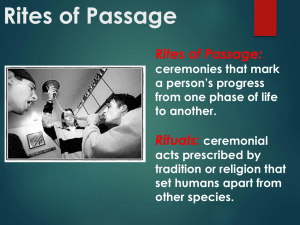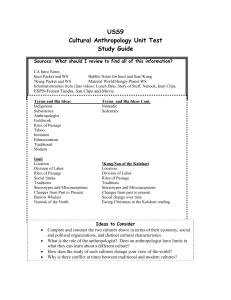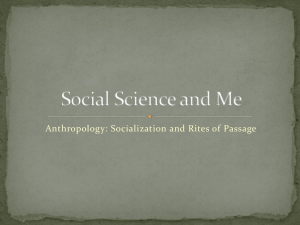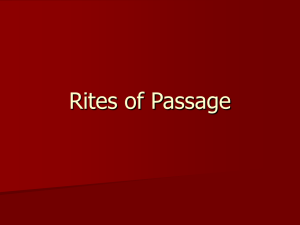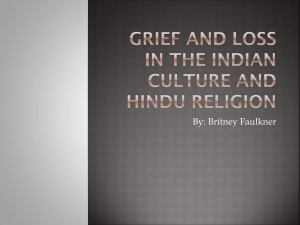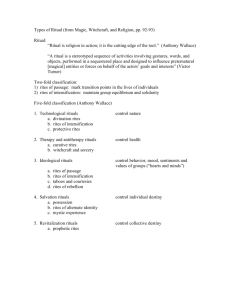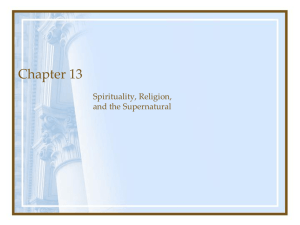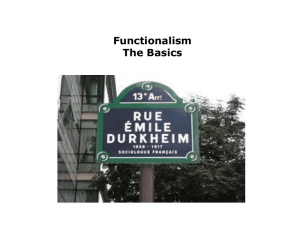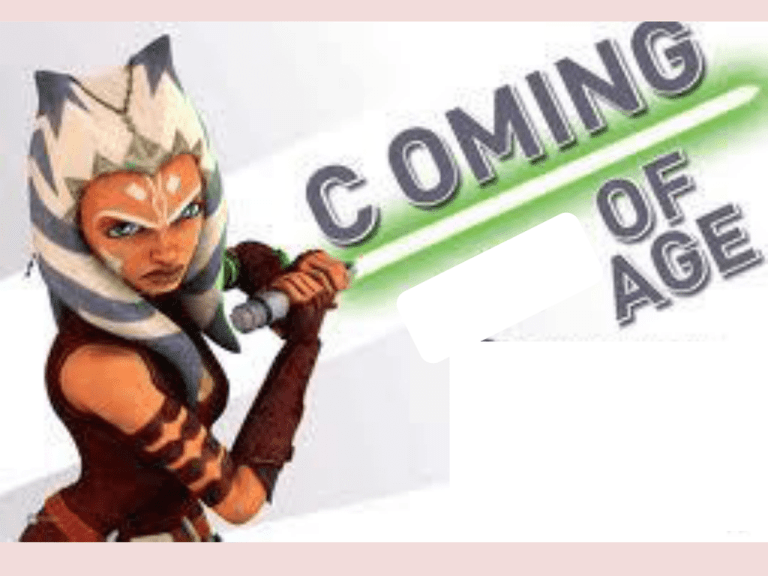
Coming of age is a young person's formal
transition from adolescence to adulthood.
Remembering that adolescence is a social
construct, for some cultures coming of age is the
formal transition from childhood to adulthood.
The age at which this transition takes places
varies in different societies and cultures, as does
the nature of the transition.
It can be a simple legal transition (turning 18
or 21) or can occur after a ritual cycle (rites of
passage).
In either case, many cultures retain
ceremonies to confirm the coming of age,
and significant benefits come with the
change.
Life-Stages
Life stages is a term that refers to the different transition points in a
persons life.
These transition points differ between societies and cultures around
the world
In western society, development researches often refer to life stages
in recognising key milestones achieved. Eg. Piaget, Kohlberg etc.
The important thing to remember about life-stages is that at each
stage a person develops and masters skills, attitudes, values etc
that are important when they come of age (become an adult).
Rites of Passage
Would you like the status of an adult right now?
Do you feel that you are capable of functioning in the adult world?
Would you accept the following so that you may be granted the
rights and responsibilities of an adult and to be fully recognised as
an adult:
o
Have your flesh scarred?
o
Have your teeth removed?
o
Have your pubic hair removed?
o
Be circumcised publicly?
These rituals are performed by many cultures to mark the
transition from when a person comes of age, that is become
an adult.
RITES OF PASSAGE is the term used to refer to ceremonies
acknowledged by a society that mark the transition from one
level of status in society to another
Unlike traditional societies, contemporary westernised
societies have changed many of the rites of passage
associated with the transition from one life stage to another.
Traditional Societies
In traditional societies, rites of passage often involve a
ceremonial acknowledgement of physical change.
For girls, menstruation typically marks the change from
child to adult. For males, it is the arrival of puberty.
Western Societies
In westernised societies, distinct rites of passage have
tended to change over time from involving the whole
community to being more personal.
What is more relevant is that in Western societies the
period known as adolescence has become an
ambiguous period whereby no public recognition is
given to their roles. Therefore, no one is sure of what
is expected of the person.
Stages in the Rites of Passage.
Separation
• Where a person is removed from society
Transition
• Where your status is unclear
Reincorporation
• Where you are accepted back into society with a new
status.
The length of time allocated for each stage
can vary enormously, from minutes to years.
For example, boys in Traditional TIWI life in
northern Australia were often separated from
their tribe for up to ten years as they gathered
the required knowledge and experience to
participate in society as men.
Questions
1.
Can you recognise the three stages in
modern rites of passage?
2.
Is there any event that closely resembles
these stages?
o
GAP year
o
Back Packing
o
Schoolies
Rights and Responsibilities
• At what age can
you:
1. Hire or buy ‘adult only’ videos?
2. Watch MA movies?
3. Drive a car by yourself?
4. Get a tattoo
5. Leave school
6. Leave home?
7. Drive a motorbike?
8. Do jury duty?
9. Vote?
10. Consent to heterosexual sex?
11. Consent to homosexual sex?
12. Join the army?
13. Marry?
14. Receive social security?
15. Join a political party?
16. Stand for parliament?
17. Choose to keep your own child?
18. Buy liquor?
19. Open a bank account in your own
name?
20. Go to gaol?
21. Gain access to contraceptives
Is there any logic in the different ages that different things are allowed?
The fact that so many more young people are
students up until 18 years of age, and an
increasing number even to 21 or 22 years, has
tended to extend the period of adolescence,
sometimes even into the 20s.
What used to be considered the rights and
responsibilities of adults are often now those of
the adolescent.
For example, the legal driving age (17 in NSW)
has not changed, even though the average 17
year old, up until the 1970s, was a wage earner
for several years. However, today, a 17 year old
is more likely to be a student and perhaps with
several years to wait before being a wage
earner.
The best examples of former adult
responsibilities
becoming
adolescent
responsibilities concern the right to vote,
witness legal documents, make a will or be a
candidate for election to Parliament.
Up until the 1970s, the age for this was 21, an
age most would be settled in a career, very
likely married or planning it, with one or two
children or on the way to paying off a house.
The 21 year old of the 1960s was an adult in
every sense of the word.
During the early 70s the age was reduced to
18, an age which, in the 1990s, sees a
majority of people far from settled in a career
or marriage or the home-buying process.
In this sense, we can see that the
adolescents have far more rights and
responsibilities both legally and politically,
than in the past.
Discuss these statements:
• “Girls on average mature faster than boys both
physically and mentally they, therefore, should be
able to have the full rights and responsibilities of
an adult at 16 whereas boys at 18!
• “Boys can be conscripted to go to war at 18
therefore, they should receive all the rights and
responsibilities of an adult then. Whereas girls do
not get conscripted therefore, they attain the full
rights and responsibilities of an adult at 21.”
Check your responses
• At what age can you without
anybody's permission:
1. Hire or buy ‘adult only’ videos?
18
2. Watch MA movies? 15
3. Drive a car? 17
4. Get a tattoo 18
5. Leave school 15
6. Leave home? 16
7. Drive a motorbike? 16 9mths
8. Do jury duty? 18
9. Vote? 18
10.Consent to heterosexual sex? 16
11. Consent to homosexual sex? 16
12.Join the army? 17
13.Marry? 18
14.Receive social security? 16
15.Join a political party? 18
16.Stand for parliament? 18
17.Choose to keep your own child?
16
18.Buy liquor? 18
19.Open a bank account in your own
name? 18
20.Go to gaol? 18
21.Gain access to contraceptives? 16

